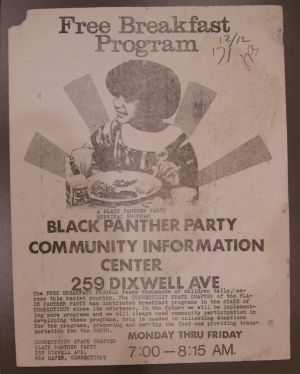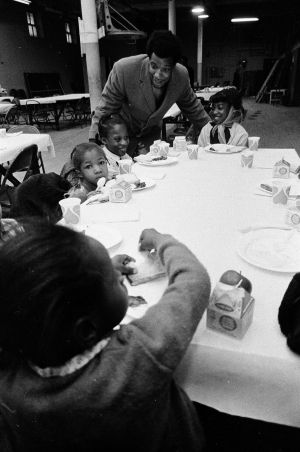Free Breakfast For Children: Difference between revisions
Florez4747 (talk | contribs) |
Florez4747 (talk | contribs) |
||
| Line 24: | Line 24: | ||
According to the [[Los Angeles Police Department]] the Special Weapons Assault Team (SWAT,) was originally created so the police force could respond to sniper and hostage situations, like situations that allegedly occurred during the [[Watts Rebellion]], but the occurrence of these events were rare (less than 5% of SWAT raids are for the original mission of the unit across the country today,<Ref>https://www.pnas.org/doi/full/10.1073/pnas.1805161115</Ref>) so the SWAT unit had never been deployed prior to the raid on the Black Panther Party's headquarters. <blockquote>In its Panther deployment, SWAT was transformed from a tool of surgical precision into a blunt-force battering ram, and that’s ultimately how it would find its calling in police departments across the country — especially in African American communities.<Ref>https://www.latimes.com/opinion/story/2019-12-08/50-years-swat-black-panthers-militarized-policinglos-angeles</Ref></blockquote> | According to the [[Los Angeles Police Department]] the Special Weapons Assault Team (SWAT,) was originally created so the police force could respond to sniper and hostage situations, like situations that allegedly occurred during the [[Watts Rebellion]], but the occurrence of these events were rare (less than 5% of SWAT raids are for the original mission of the unit across the country today,<Ref>https://www.pnas.org/doi/full/10.1073/pnas.1805161115</Ref>) so the SWAT unit had never been deployed prior to the raid on the Black Panther Party's headquarters. <blockquote>In its Panther deployment, SWAT was transformed from a tool of surgical precision into a blunt-force battering ram, and that’s ultimately how it would find its calling in police departments across the country — especially in African American communities.<Ref>https://www.latimes.com/opinion/story/2019-12-08/50-years-swat-black-panthers-militarized-policinglos-angeles</Ref></blockquote> | ||
The raid resulted in | The raid resulted in <blockquote>13 arrests and a total of 72 criminal counts being filed. But at trial, the Panthers’ attorneys, including a young Johnnie Cochran, argued that the group had acted in self-defense. SWAT had entered the building unannounced with guns blazing. | ||
A mixed-race jury agreed, finding the Panther defendants not guilty on almost all charges, including the most serious ones of assault with a deadly weapon and conspiracy to murder policemen. Arafat, who had skipped bail and fled underground to Puerto Rico, returned to Los Angeles.<Ref>https://www.latimes.com/opinion/story/2019-12-08/50-years-swat-black-panthers-militarized-policinglos-angeles</Ref></Blockquote> | |||
== New York == | == New York == | ||
Revision as of 01:29, 7 January 2023
Huey P. Newton and Bobby Seale founded the Black Panther Party for self-defense in 1966 in Oakland, California. The organization would grow and open branches across the so called United States. They would begin their free breakfast for children program in January, 1969, at Father Earl A. Neil’s St. Augustine Episcopal Church in Oakland, California, feeding 11 children the first day and growing to 135 children by the end of the week.[1] Less than two months later a second location for feeding children would open in San Francisco at Sacred Heart Church. As the Black Panther Party proliferated across the country they made the free breakfast program a mandatory staple of each branch. At its peak, approximately forty-five chapters across the country participated in the Breakfast Program, feeding thousands of children every day.[2]
The free breakfast program was a response to the United States federal government's War on Poverty, which was supposed to be providing food, housing, and safety to impoverished people across the country. The Black Panther party felt as though the so called War on Poverty was not taking care of the Black Community, so they chose to take matters into their own hands. [3] The free breakfast program was one of the many Black Panther Party Survival Programs, which included education programs, health clinics, shoe giveaways, clothing giveaways, and prison busing program, which helped bring family members to prisons to visit their loved ones, sickle cell anemia testing (they tested over half a million people,) and a free ambulance service in Winston Salem, North Carolina; All of the Black Panther Party survival programs were free, and were all pieces of the party's goals of Black self-determination, and liberation from the constraints of capitalism and the legacies of slavery. [4]
Food Sovereignty
Party Branches
Oakland and San Francisco
The free breakfast programs in Oakland and later San Francisco garnered support from people from various walks of life and resulted in many donations to the program and general support from moderate white people. President Hoover, in a memo to a San Francisco surveillance officer in 1969, stated
One of our primary aims in counterintelligence as it concerns the [Black Panther Party] is to keep this group isolated from the moderate black and white community which may support it ... ... This is most emphatically pointed out in their Breakfast for Children Program, where they are actively soliciting and receiving support from uninformed whites and moderate blacks.[5]
Chicago
Los Angeles
In Los Angeles Flores Forbes spoke to community members about how the breakfast program would help children “grow and intellectually develop because children can’t learn on empty stomachs.” The breakfast program fed around 1,200 children a week in Los Angeles. [6]
On December, 8th, 1969 the first SWAT raid to be conducted in the so called United States was undertaken at the Los Angeles Branch Head Quarters of the Black Panther Party. More than 350 police officers were involved in the raid to allegedly execute arrest warrants; There were 13 Black Panther members in the building including three women and five teenagers. The LAPD would detonate explosives on the roof of the headquarters and call in a tank for reinforcements during the raid. Bernard Arafat, a Black Panther Party member,
awoke to explosions rocking the library of the Black Panthers’ 41st and Central Avenue headquarters in Los Angeles. Above him, footsteps stomped across the roof. Then gunfire erupted. Arafat wasn’t a seasoned Panther. He was a 17-year-old runaway from juvenile hall whose parents had both died when he was 13. After years of committing small-time crimes, Arafat was taken in by the Panthers and gained a sense of purpose. He helped with the organization’s breakfast program, feeding hungry kids on their way to school.[7]
According to the Los Angeles Police Department the Special Weapons Assault Team (SWAT,) was originally created so the police force could respond to sniper and hostage situations, like situations that allegedly occurred during the Watts Rebellion, but the occurrence of these events were rare (less than 5% of SWAT raids are for the original mission of the unit across the country today,[8]) so the SWAT unit had never been deployed prior to the raid on the Black Panther Party's headquarters.
In its Panther deployment, SWAT was transformed from a tool of surgical precision into a blunt-force battering ram, and that’s ultimately how it would find its calling in police departments across the country — especially in African American communities.[9]
The raid resulted in
13 arrests and a total of 72 criminal counts being filed. But at trial, the Panthers’ attorneys, including a young Johnnie Cochran, argued that the group had acted in self-defense. SWAT had entered the building unannounced with guns blazing. A mixed-race jury agreed, finding the Panther defendants not guilty on almost all charges, including the most serious ones of assault with a deadly weapon and conspiracy to murder policemen. Arafat, who had skipped bail and fled underground to Puerto Rico, returned to Los Angeles.[10]
New York
COINTELPRO
The Black Panther Party was victim to the FBI's violent, covert and illegal operation known as COINTELPRO, or Counter Intelligence Program. According to a memo from FBI Director J. Edgar Hoover the goal of COINTELPRO was
... to expose, disrupt, misdirect, discredit, or otherwise neutralize the activities of black nationalist, hate-type organizations and groupings, their leadership, spokesmen, membership, and supporters, and to counter their propensity for violence and civil disorder.[11]
Hoover called the free breakfast program “potentially the greatest threat to efforts by authorities to neutralize the BPP and destroy what it stands for,” and authorized extremely grotesque police counter-measures to destroy it. These operations ranged from disinformation campaigns telling parents in San Francisco that the food was infected with venereal disease, to the Chicago police breaking into a Church the night before its first food services to mash up and urinate on the children's breakfasts.[12]
Legacy of Free Breakfast Program
Oakland Community Gardens
Food Justice Movement
A major legacy of the Free Breakfast Program is the food justice movement it helped catalyze. The Party played a leading role in approaching food through a revolutionary lens, inspiring numerous food-related initiatives “used as a tool to develop a set of community-based solutions that might help transform the very political and economic systems that had historically oppressed low-income and ethnic minority communities.”[13]
This reflected the view of David Hillard, former Chief of Staff of the Black Panther Party, that "we’ve always been involved in food, because food is a very basic necessity, and it’s the stuff that revolutions are made of."[14]
USDA School Breakfast Program
By 1969, the success of the program had become a matter of federal policy debate, with the National School Lunch Program administrator admitting in a 1969 U.S. senate hearing that the Panthers were feeding more poor school children than the State of California.[15]
According to History.com:
The public visibility of the Panthers’ breakfast programs put pressure on political leaders to feed children before school. The result of thousands of American children becoming accustomed to free breakfast, former party member Norma Amour Mtume told Eater, was the government expanded its own school food programs. Though the USDA had piloted free breakfast efforts since the mid 1960s, the program only took off in the early 1970s—right around the time the Black Panthers’ programs were dismantled. In 1975, the School Breakfast Program was permanently authorized.[16]
In response:
The BPP saw such actions as an unfair co-option on the part of establishment actors who looked to minimize the BPP’s importance and to move the control of community program development and management away from low-income Black communities themselves. Such co-option represented another factor that led to the slow demise of the BPP’s influence in communities across the nation.[17]
It was not until a new set of waivers were established in 2020 in response to the COVID-19 pandemic that a complicated and often stigmatizing bureaucratic application process was eliminated, and free lunches were provided for all students. Before this new expansion, as many as 75% of U.S. school districts had unpaid "student meal debt."[18] After the federal breakfast programs were established, noticeable improvements in students' levels of focus, energy, and reduced stress were observed by teachers, while schools no longer had to deal with unnecessary paperwork.[19]
This expansion proved short-lived. In 2022, federal school meal programs faced a "perfect storm" according to Diane Pratt-Heavner, spokesperson for the School Nutrition Association.[20]. Even though a poll in 2021 found that "74% of Americans support making universal free school meals permanent nationwide," the Democratic Party's surrender to Republican opposition led to the expiration of this highly popular policy, once again excluding tens of millions of students from receiving free meals.[21][22]
Sources
- ↑ https://www.aaihs.org/the-black-panther-party/
- ↑ https://www.history.com/news/free-school-breakfast-black-panther-party
- ↑ https://www.eater.com/2016/2/16/11002842/free-breakfast-schools-black-panthers
- ↑ https://www.pbs.org/hueypnewton/actions/actions_survival.html
- ↑ https://www.eater.com/2016/2/16/11002842/free-breakfast-schools-black-panthers
- ↑ https://www.aaihs.org/the-black-panther-party/
- ↑ https://www.latimes.com/opinion/story/2019-12-08/50-years-swat-black-panthers-militarized-policinglos-angeles
- ↑ https://www.pnas.org/doi/full/10.1073/pnas.1805161115
- ↑ https://www.latimes.com/opinion/story/2019-12-08/50-years-swat-black-panthers-militarized-policinglos-angeles
- ↑ https://www.latimes.com/opinion/story/2019-12-08/50-years-swat-black-panthers-militarized-policinglos-angeles
- ↑ https://rethinkingschools.org/articles/cointelpro-teaching-the-fbi-s-war-on-the-black-freedom-movement/
- ↑ https://www.history.com/news/free-school-breakfast-black-panther-party
- ↑ https://timeline.com/the-black-panthers-helped-free-breakfast-programs-9e4756d93510
- ↑ Garrett Broad, "More than Just Food: Food Justice and Community Change"
- ↑ https://www.blackpast.org/african-american-history/black-panther-partys-free-breakfast-program-1969-1980/
- ↑ https://www.history.com/news/free-school-breakfast-black-panther-party
- ↑ Garrett Broad, "More than Just Food: Food Justice and Community Change"
- ↑ https://www.theguardian.com/environment/2022/jun/04/us-school-hunger-crisis-federal-waivers-end
- ↑ https://www.nbcnews.com/news/us-news/free-school-lunches-are-ending-house-passes-deal-summer-meals-child-nu-rcna34745
- ↑ https://www.nbcnews.com/news/us-news/free-school-lunches-set-end-creating-perfect-storm-high-inflation-rcna33688
- ↑ https://melmagazine.com/en-us/story/black-panthers-free-breakfast-program
- ↑ https://www.npr.org/2022/10/26/1129939058/end-of-nationwide-federal-free-lunch-program-has-some-states-scrambling

